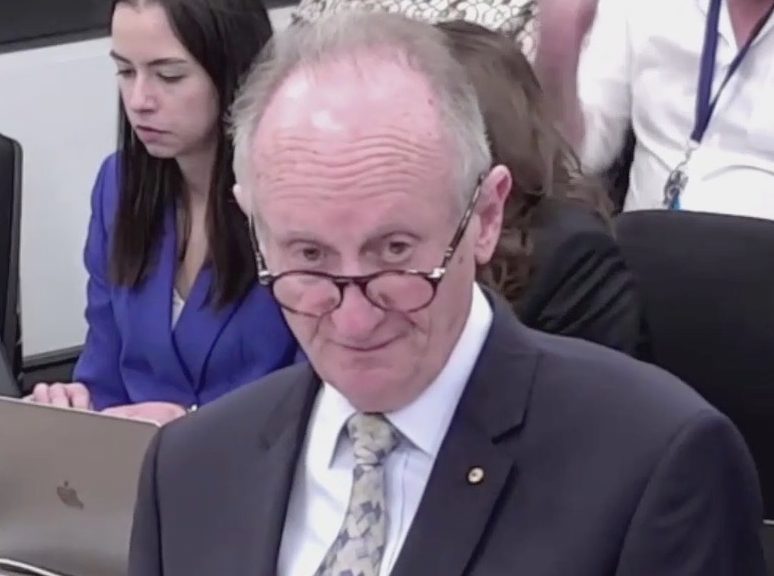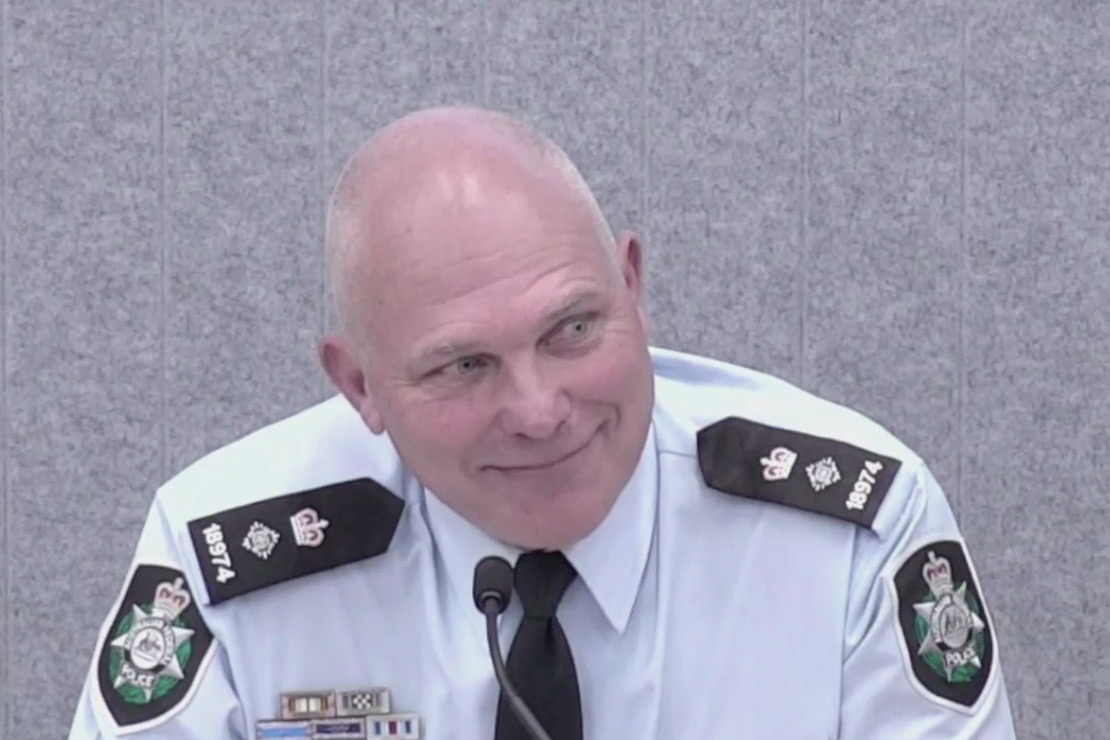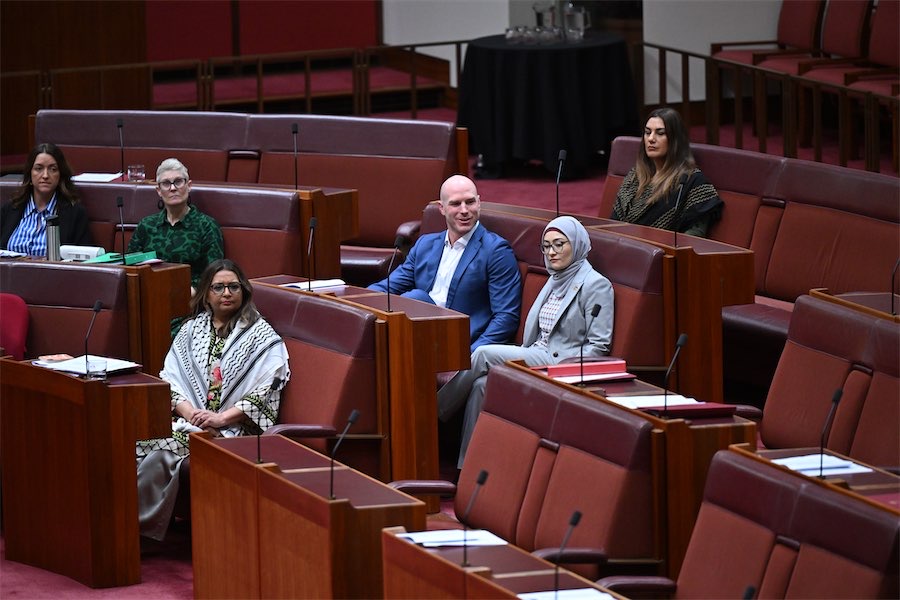
“CityNews” legal columnist and former barrister HUGH SELBY is commentating regularly on the Sofronoff Inquiry’s public hearings, focusing upon the advocacy and witness performances.
The Board of Inquiry, led by Commissioner Walter Sofronoff KC, a former president of the Queensland Court of Appeal, was established by the ACT government in December to examine how police, prosecutors and a victim support service handled allegations made by Brittany Higgins against her former colleague Bruce Lehrmann.
The covers are off and the umpire is signalling
IT’S a bit nippy these mornings in Canberra, more than cold enough to put hands in pockets and feel in one’s bones the depressing, grey light coldness in the early morning.
That usually gives way to those clear, bright blue skies for which wintry Canberra is famous.
The groundsmen are coming out to pull away the covers. While that’s happening let’s quickly review the state of play and the match origins for those who have just fled work in search of a bit of entertainment.
This is a special exhibition match. It was announced with much fanfare by local chiefs Andrew and Shane, chief minister and attorney-general respectively, in the lead up to Christmas.
Unlike the unfolding Tassie stadium fiasco, this decision was a political winner. It is also a hell of a lot cheaper, less than five million all up. The officiating and preparation staff were brought in from interstate some months ago and have been busy ever since.
Those other local Canberra sports that have been trying for years to get national recognition and a place in the big competitions have got to be jealous of this “pop up” success.
This commentary is not from the main box. That’s reserved for the mainstream. They are well resourced and pour over the stats for the players. They can tell us, and they do, lots of background information (generously provided by the preparation team) about how the key players performed in some earlier competitions in what was then the Higgins Cup from early 2019 to late last year.
They have also shared with us the career backgrounds of some key players and the umpire – state and national appearances at the top level, and even international umpire experience.
We’re down at ground level, far below the members’ stand, with the happy day trippers. It’s a carnival atmosphere down here. Because the reserved seating is packed we get to watch the action on the livestream. That’s much better than it sounds.
Sure, we don’t get the visceral atmospherics that one gets by being at the action but, on the other hand, we get to see the players and the umpire in close up and we don’t need binoculars.
And we’ve seen a lot since this game started. The opening batsman was another Shane (Drumgold), known by his nickname of DPP. He was at the crease for days. He was there so long that he retired hurt. He hasn’t been able to go back to his day job. The poor bastard was the victim of a paparazzi who photographed him recuperating at home. How sick is that?
Next up, and with a lot of poise, was Steven (defence advocate Steven Whybrow). Very solid performance. Never fazed by any of the bowling. His day job is as a barrister. He is multi-talented, as he can play in a lot of spots and in different conditions. During last year’s match he played for weeks for the defence team for no fee, which is pretty extraordinary.
This being an exhibition match the batsmen don’t need to be bowled or caught to leave the field. The umpire will tell them that enough is enough. That’s what’s happened with Shane and Steve.
Scott was the third man up. That’s three S’s in a row. His regular team are the police and they’re a proud and unified bunch. So far, it has been all for one and one for all. They played pretty much every game in last year’s match. In this game he’s been front of wicket for a couple of days.
Ah, the covers are off, and the umpire is signalling.

It’s Moller at the crease, Tedeschi bowling
We can see that Scott (Supt Scott Moller) is at his crease and medium-pace bowler Tedeschi (Mark Tedeschi KC, advocate for the DPP Drumgold) is pacing up and down, steadily, but with serious concentration on his face.
Yesterday was a hard slog. Tedeschi sent down hundreds of balls, and Scott blocked, hit a lot of singles, and was cheered whenever he sent the ball to the boundary.
Close up showed that Scott became more assertive as the day went on. We even saw a grin or two. If he’d had any anxieties at the start of the day they were fading away, over by over.
Although there was nothing on Tedeschi’s face to show it, he must have wondered: “Why, why is this so difficult?”
It wasn’t just the energy for the all-day bowling. He also had to deal with objections that his foot was stepping over the line and that some of his deliveries used a prohibited action. Those were dealt with in private session so I can’t tell you what happened, only that he came back each time, unperturbed, and got on with the job.
Wednesday might have been easier on Tedeschi. But he started with an ad hominem attack on Scott, by reference to Scott making a “like” posting on LinkedIn. This was after the decision that there would be no further proceedings in the Higgins matter.
Tedeschi wanted to do over Scott for liking a comment made by another person about the presumption of innocence. Scott readily agreed that in hindsight he should not have “liked” it. Damage to batter Scott, nil.
Then he took Scott to a written report (SAPR Committee Report) about complaints of sexual assaults and the subsequent handling of them in the ACT.
Tedeschi faced problems because a data table to which he took Scott so as to found a claim of police disinclination to charge was poorly laid out.
As Kate Richardson SC, advocate for the AFP, pointed out, there was no finding that the police were undercharging. The reasons for low rates of charging are still unknown. Damage to Scott and advantage to Tedeschi’s DPP client, still nil.
Next were questions about an internal review that Scott commissioned in mid 2021. The review report tabulates the outcomes for case finalisation over some years.
Commissioner Sofronoff intervened to say that a question to Scott about a “low” rate of charging was meaningless for factors that he stated. “It wasn’t helping (the commissioner)”. Not heard. It was quickly followed by, “We’re going nowhere. I’d ask you to stop this”. The inquiry then went into private session.
Moller at the crease, Dwyer bowling
Peggy Dwyer, advocate for Heidi Yates, the Victims of Crime Commissioner, was interposed, which gave Tedeschi time to prepare for his final session with Scott.
She has an engaging, likeable personality. What a pity, as with the other advocates, that there was no signposting of where she and the witness would be going. She spoke rather fast.
As her cross went on its aim became clear: to ensure that everyone understood how well trained, pleasant and professional was her client. Along the way she wanted everyone to understand that some of Scott’s comments in his written statement about Ms Yates reflected a misunderstanding about her role. He conceded that. Mission accomplished.
She has a nice advocacy device of taking off her glasses when she is making a question for emphasis. That’s reminiscent of James Mason’s same device as the advocate in the 1982 film “The Verdict” (written by David Mamet, directed by Sidney Lumet). Paul Newman was the opposing lawyer.
Taking off your glasses creates an illusion that you can see into the witness. It can be very effective.
Scott said that he would be happy to sit down with Ms Yates and discuss how to improve what is done with sexual assault complaints. He respects her. He trusts her.
Dr Dwyer went through various communications between Ms Yates and police to show that Ms Yates was invariably cordial and professional. Moreover, Ms Yates “facilitated” contact with Ms Higgins. Scott agreed.
There were informative exchanges among Dwyer, Scott and the commissioner which set out the staffing, supervision and training shortfalls in our police investigative teams.
Dr Dwyer was adroit at picking up a comment from the commissioner and using it to move her questioning along.
There were then questions about Scott recalling Ms Yates saying to him that Ms Higgins was “the face of a movement”. Dwyer was asserting that Ms Yates didn’t say that. Scott was firm that she did.
Dr Dwyer then changed tack. She is long past the beginner’s error of then saying, “I put it to you that you are a liar”.
This was not a combative cross-examination. Her delivery was straight and true, but its objective was not to dismiss Scott. To the contrary she wanted him on her side and he obliged. Being nice works.
Dr Dwyer asked for the lunch break a little early so that she could shorten her notes and take less time after lunch. Unsurprisingly, the commissioner was happy to do so.
After lunch Scott confirmed that Ms Yates’ help was essential to having Ms Higgins finally hand over her phones. The police had made some eight or nine previous requests for those phones. Ms Yates was an effective facilitator between police and Ms Higgins. Ms Yates also willingly had an interview with police. Scott re-iterated that he would be happy to sit down with Ms Yates over a cup of tea.
Dr Dwyer, having successfully established both the many positive aspects of Ms Yates’ approach to her job as supporting complainants and her good relationship with Scott, left the field, probably feeling well satisfied.

A six… and Moller triumphs
Tedeschi returned for another spell. He pressed Scott to admit that his early view that there was insufficient evidence to charge was wrong. Scott replied that his opinion changed, not that his early view was wrong. Tedeschi then made repeated “suggest” propositions to criticise the police and Scott in particular. Scott batted each of them away.
Tedeschi then “suggested” that the jury, not the police, should be deciding issues of credibility. Wrong question. Police investigate and we report what we find, and we change our minds as the investigation goes on.
(There was then another break. When the hearing resumed Scott was taking questions from his advocate, possibly from Tedeschi, and then from the commissioner. There was no audio for five minutes or so.)
The audio resumed with Scott answering a summary, wrap up, question from the commissioner.
Scott’s final answer included: “The police had deeply seated views. Even though they had those views they pushed forward against their own beliefs.
“Even if their views… continued to be held… they were committed to the process. Because that’s what we do as police.
“Our opinion… is not as important as the greater good. I’m proud of them to have those opinions.”
That was a six. Scott got his century and the umpire sent him home to cheers all round.
The batting order
What we’re all waiting for are the tail enders. There’s Ms Yates, lawyer, trauma specialist and Victims of Crime Commissioner. There’s no question about her job commitment. There’s no question about her positive involvement in helping interactions between Ms Higgins and police.
What is in question is how she played the game at court last year. The government sponsors of this match clearly have great faith in her: they extended her job term after announcing this exhibition match.
That said, despite her advocate Dr Dwyer’s good work with Scott, Ms Yates has already been injured in the practice nets, the damage coming from bowler Tedeschi and second batter Steven.
No doubt she will be well prepared, being on top of how everyone has played in this match. That’s the beauty of today’s technology: instant replays of important moments. The fielding will be in close and watchful.
If we’re lucky, there will be an appearance by someone from ACT Legal Aid, coming to assure us that Legal Aid does not instruct defence lawyers to go easy on complainants at trial and that it doesn’t blacklist competent, local barristers. Those allegations are out there and they need to be put to bed.
But before they appear there are to be more police tomorrow.
Postscript
Today’s reporting is dedicated to Terry Buddin (who hates public acknowledgment), a former ACT DPP, who went on to be NSW Senior Public Defender, Crown Advocate, Supreme Court judge, and then an inspirational teacher to criminal law practitioners (“think and think again about the words you are using to this court”) and the mentor of a lifetime to some of us. He is well known to some of the batters and bowlers in today’s game. He was a fine cricketer, too (even had to be stretched after bowling too long in a match in his youth) and is still a great guy.
“CityNews” legal commentator and former barrister Hugh Selby is writing running commentary on the Sofronoff Inquiry’s public hearings, focusing upon the advocacy and witness performances. The “CityNews” coverage of the inquiry, including his daily reviews, are here.
Hugh Selby’s free podcasts on “Witness Essentials” and “Advocacy in court: preparation and performance” can be heard on the best known podcast sites.
Who can be trusted?
In a world of spin and confusion, there’s never been a more important time to support independent journalism in Canberra.
If you trust our work online and want to enforce the power of independent voices, I invite you to make a small contribution.
Every dollar of support is invested back into our journalism to help keep citynews.com.au strong and free.
Thank you,
Ian Meikle, editor









Leave a Reply